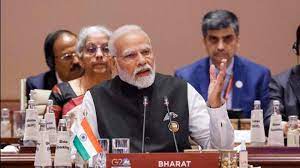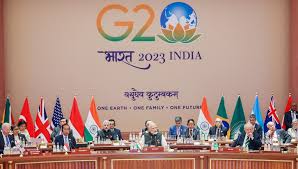G20 Summit: India achieves consensus on G20 Delhi Declaration on Ukraine War
 VINAY KUMAR
VINAY KUMAR
NEW DELHI : In a major breakthrough at the G20 Summit being held in the national Capital, India managed to put together a consensus under its G20 presidency as all leaders agreed to the New Delhi Declaration after the text on Ukraine was changed.
In a huge win for India’s G20 presidency, the New Delhi Leaders’ Summit Declaration was adopted on Saturday after consensus was reached among the member states.The big development was welcomed by several leaders and officials, who said the “historic” document recognises Prime Minister Narendra Modi’s emphasis on human-centric globalisation.
Several rounds of protracted negotiations were held among the member-nations with consensus eluding on Ukraine which is entangled in a one-and-half-year old war with Russia. After days of speculation and skepticism, a consensus was reached at the G20 Summit and the New Delhi G20 Leaders’ Summit Declaration was adopted on Saturday. The adoption of the declaration was announced by PM Modi and the reactions started pouring in immediately after that. Sources told Newstrack24x7.com that US President Joe Biden’s support was significant in helping India achieve consensus on the declaration. Apart from formal sherpa negotiations, there were a lot of back channel talks to have consensus.
“Friends, we have just got good news. With the hard work of our teams, and with the cooperation of you all, there is consensus on the New Delhi G20 Summit Leaders Declaration,’’ Prime Minister Narendra Modi announced in a short televised statement in Hindi on Saturday afternoon.
The Ministry of External Affairs (MEA) shared the declaration relating to Ukraine which stressed that today’s era must not be of war.“We highlighted the human suffering and negative added impacts of the war in Ukraine with regard to global food and energy security, supply chains, macro-financial stability, inflation and growth, which has complicated the policy environment for countries which are still recovering from the COVID-19 pandemic and the economic disruption which has derailed progress towards the SDGs. There were different views and assessments of the situation,’’ the MEA said.
The declaration emphasised that the use or threat of using nuclear weapons is deemed “inadmissible.’’ The declaration on Ukraine called upon all ”states to uphold the principles of international law including territorial integrity and sovereignty, international humanitarian law, and the multilateral system that safeguards peace and stability. The peaceful resolution of conflicts, and efforts to address the adverse impact of the war on the global economy and welcome all relevant and constructive initiatives that support a comprehensive, just, and durable peace in Ukraine that will uphold all the Purposes and Principles of the UN Charter for the promotion of peaceful, friendly, and good neighbourly relations among nations in the spirit of `One Earth, One Family, One Future.’’
For India, the consensus on Ukraine has emerged as a huge diplomatic win as the impasse on the Ukraine issue was an uphill task to break. The negotiators from the member countries worked patiently to work out an agreement on about 75 other paragraphs in the draft which harped on issues like regulation of crypto-currency, climate transition and financing for it. India’s emphasis, under Prime Minister Modi’s leadership, at the G20 has been on human-centric globalisation and the concerns of the global South.
The thorny issue of Ukraine was looming large in the background of the two-day G20 Summit and it looked difficult that a consensus would be achieved but the revision in the text on Ukraine and long drawn negotiations finally turned out to be fruitful.
Apart from top world leaders, including the U.S. President Joe Biden, and heads of states and governments from 20 member-countries and about 10 invited guest nations , heads of 14 international organisations like the European Union and the United Nations are also attending the New Delhi Summit. Another major development was agreement on India’s proposal to accord a permanent seat to the African Union at the high table of G20, making the 55-nation grouping a member of the G20 grouping.
(The writer is a senior journalist based in New Delhi)

